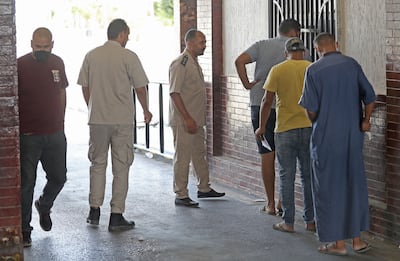Protesters and armed groups from the city of Zuwara who accuse Libya's Tripoli-based government of racism towards them for being predominantly Amazigh forced ministers to cancel the reopening of the country's main border crossing with Tunisia.
Men with weapons and protesters blocked the road to the crossing at the coastal town of Ras Ajdir in north-west Libya, leading the Government of National Unity to cancel its reopening.
Demonstrators were from the coastal city of Zuwara, the population of which is predominantly from the Amazigh ethnic group – also known as Berbers.
The crossing, which was shut in March following armed clashes between Zuwara residents and security forces, was scheduled to fully open on Monday.
This would have been the result of an agreement between the Minister of Interior Imed Trabelsi and his Tunisian counterpart, Khaled Nouri.
Ras Ajdir border crossing has been the subject of previous conflict between Zuwara residents and Mr Trabelsi.
Mr Trabelsi has repeatedly accused tribal leaders’ of running the city according to their own rules, and said that “Zuwara cannot operate outside of state’s institutions”.
Zuwara residents say Mr Trabelsi excluded them from the negotiation process with Tunisian parties on the important crossing.
On Sunday, Zuwara leaders said Mr Trabelsi adopted “an ethnic and racist approach towards the Amazighs of Libya”.
They said the Libyan government has been marginalising and discriminating against local security forces and removing them from their duties in the city because of their Amazigh ethnic background.
Following the renewed protests, Libyan Prime Minister Abdul Hamid Dbeibah met on Monday with a delegation from the Zuwara Municipal Council and a number of Amazigh tribal leaders to review their demands and service conditions at the Ras Ajdir border crossing, according to a Facebook post from the Government of National Unity.
“Developing the Ras Ajdir crossing is a necessary step towards providing vital services that many Libyans need,” Mr Dbeibah said.
He ordered the reopening of the Abu Kammash road to the border crossing and the completion of procedures to reopen it, in accordance with the plan agreed with the Tunisian government.
The Ministry of Interior confirmed last Saturday that they had finished all the necessary procedures and arrangements to reopen the border crossing, following a meeting with the Tunisian side.
In preparation for the reopening, the two countries have established six electronic registration centres for Libyan citizens’ cars and decided to exempt them from entrance fees, on condition that no armed clashes take place.
Authorities also said that they have found a solution to issues with many people on both sides of the border having similar names. In the past, this led to innocent people being mistakenly identified as wanted criminals or militants.
Libya has rival governments, the Tripoli-based Government of National Unity in the west and the rival House of Representatives, based in Tobruk, in the east.
THE SPECS
Engine: 1.5-litre
Transmission: 6-speed automatic
Power: 110 horsepower
Torque: 147Nm
Price: From Dh59,700
On sale: now
THE%20FLASH
%3Cp%3E%3Cstrong%3EDirector%3A%3C%2Fstrong%3E%20Andy%20Muschietti%3Cbr%3E%3Cstrong%3EStars%3A%3C%2Fstrong%3E%20Sasha%20Calle%2C%20Ben%20Affleck%2C%20Ezra%20Miller%3Cbr%3E%3Cstrong%3ERating%3A%20%3C%2Fstrong%3E3%2F5%3C%2Fp%3E%0A
Results
2pm: Serve U – Maiden (TB) Dh60,000 (Dirt) 1,400m; Winner: Violent Justice, Pat Dobbs (jockey), Doug Watson (trainer)
2.30pm: Al Shafar Investment – Conditions (TB) Dh100,000 (D) 1,400m; Winner: Desert Wisdom, Bernardo Pinheiro, Ahmed Al Shemaili
3pm: Commercial Bank of Dubai – Handicap (TB) Dh68,000 (D) 1,200m; Winner: Fawaareq, Sam Hitchcott, Doug Watson
3.30pm: Shadwell – Rated Conditions (TB) Dh100,000 (D) 1,600m; Winner: Down On Da Bayou, Xavier Ziani, Salem bin Ghadayer
4pm: Dubai Real Estate Centre – Maiden (TB) Dh60,000 (D) 1,600m; Winner: Rakeez, Patrick Cosgrave, Bhupat Seemar
4.30pm: Al Redha Insurance Brokers – Handicap (TB) Dh78,000 (D) 1,800m; Winner: Capla Crusader, Bernardo Pinheiro, Rashed Bouresly
The Bio
Amal likes watching Japanese animation movies and Manga - her favourite is The Ancient Magus Bride
She is the eldest of 11 children, and has four brothers and six sisters.
Her dream is to meet with all of her friends online from around the world who supported her work throughout the years
Her favourite meal is pizza and stuffed vine leaves
She ams to improve her English and learn Japanese, which many animated programmes originate in
Wenger's Arsenal reign in numbers
1,228 - games at the helm, ahead of Sunday's Premier League fixture against West Ham United.
704 - wins to date as Arsenal manager.
3 - Premier League title wins, the last during an unbeaten Invincibles campaign of 2003/04.
1,549 - goals scored in Premier League matches by Wenger's teams.
10 - major trophies won.
473 - Premier League victories.
7 - FA Cup triumphs, with three of those having come the last four seasons.
151 - Premier League losses.
21 - full seasons in charge.
49 - games unbeaten in the Premier League from May 2003 to October 2004.
The years Ramadan fell in May
Other key dates
-
Finals draw: December 2
-
Finals (including semi-finals and third-placed game): June 5–9, 2019
-
Euro 2020 play-off draw: November 22, 2019
-
Euro 2020 play-offs: March 26–31, 2020
MATCH INFO:
Second Test
Pakistan v Australia, Tuesday-Saturday, 10am daily at Zayed Cricket Stadium, Abu Dhabi
Entrance is free
Our legal advisor
Rasmi Ragy is a senior counsel at Charles Russell Speechlys, a law firm headquartered in London with offices in Europe, the Middle East and Hong Kong.
Experience: Prosecutor in Egypt with more than 40 years experience across the GCC.
Education: Ain Shams University, Egypt, in 1978.
Married Malala
Malala Yousafzai is enjoying married life, her father said.
The 24-year-old married Pakistan cricket executive Asser Malik last year in a small ceremony in the UK.
Ziauddin Yousafzai told The National his daughter was ‘very happy’ with her husband.
Cricket World Cup League Two
Oman, UAE, Namibia
Al Amerat, Muscat
Results
Oman beat UAE by five wickets
UAE beat Namibia by eight runs
Fixtures
Wednesday January 8 –Oman v Namibia
Thursday January 9 – Oman v UAE
Saturday January 11 – UAE v Namibia
Sunday January 12 – Oman v Namibia



